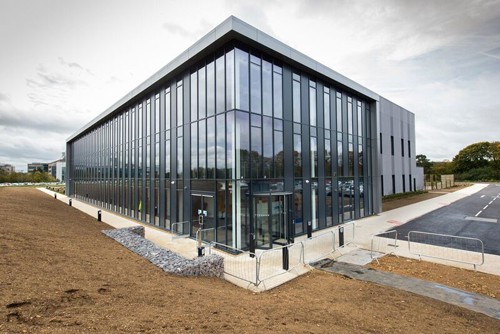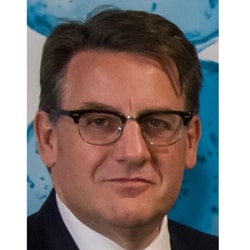
The forward-looking strategy by the government looks set to pay off – just as long as it can translate its drug development and manufacturing lead into final local market access via the NHS.
The strategy is aimed at learning lessons from previous decades, where the UK failed to translate groundbreaking scientific innovation into marketable products – only to see other nations grab the baton and cross the finish line in its place.
 Keith Thompson (pictured right), chief executive of the government-funded Cell and Gene Therapy Catapult, says the most obvious example of this was monoclonal antibodies, which the UK played a lead role in developing but claimed only a modest share in their multi-billion dollar commercial success.
Keith Thompson (pictured right), chief executive of the government-funded Cell and Gene Therapy Catapult, says the most obvious example of this was monoclonal antibodies, which the UK played a lead role in developing but claimed only a modest share in their multi-billion dollar commercial success.
Thompson says the Catapult will help avoid the ‘invented here, exploited somewhere else’ syndrome.
Being opened today by business secretary Greg Clark, the Cell and Gene Therapy Catapult is located in the biotech cluster in Stevenage, not far from London. It is already working with four biotechs working in so-called ‘advanced therapies’ – Autolus, Cell Medica, AdaptImmune and Freeline.
After having built the strategy over five years, Thompson is confident that the UK is “without doubt” the leader in cell and gene therapy in Europe.
“The UK is in a really good position, and we haven’t got here by accident. There has been sustained investment in the translational space, [and] capital [to support businesses] has played a role in that.
“The architects of this strategy, including the government, should get credit for getting us to this position.”
Cell and gene therapy is unquestionably the life science sector’s most exciting field currently, confirmed by the US approval last year of the first two CAR-T drugs, Novartis’ Kymriah and Gilead/Kite’s Yescarta, plus Spark Therapeutic’s AAV-based gene therapy. Also working on the site is contract research specialist Thermo Fisher Scientific, helping to create an ecosystem of cell and gene therapy expertise.
The Cell and Gene Catapult has been backed by more than £60m in government funding, with 160 of its own in-house experts.
The venture is already helping these UK biotech companies to perfect their manufacturing processes and scale up fast.
The facility has manufacturing capacity for large-scale allogeneic production – up to 1,000 litres – and up to 1,000 litres in viral vector products. This makes it a unique resource and helps smaller companies scale up without having the resources of the big players such as Novartis and Gilead/Kite.
 The Catapult’s capacity will comfortably accommodate the needs of its resident companies in their early years, as they conduct pivotal trials and seek regulatory approval.
The Catapult’s capacity will comfortably accommodate the needs of its resident companies in their early years, as they conduct pivotal trials and seek regulatory approval.
“This footprint allows people to get going at scale early,” says Thompson, and stresses that the Catapult is not a contract manufacturing centre.
“The objective is to get companies manufacturing themselves, and they can choose in the longer run if they are going to sub-contract any of that work.”
Once approved and a commercial hit, a product is likely to need its own dedicated factories, probably in more than one country – precisely the position the UK government wants to ‘catapult’ its biotech firms into ahead of international competition.
Keith Thompson and his team also identified regulatory barriers, scalability barriers, clinical barriers and health economic barriers to health system uptake when first establishing the venture, with the aim of troubleshooting all of these with companies.
Overshadowing all investments in the UK at the moment is, of course, Brexit. Thompson acknowledges that this is an issue, but is confident that the UK will be able to strike a deal with the EU27 to ensure products manufactured in the UK can be exported to Europe.
Also vital to a thriving innovative sector is local market uptake – and in this regard the UK’s NHS has been slow over the years to adopt new therapies compared to other leading European countries and the US.
To address the clinical barriers to adopting these entirely novel cell and gene therapies, the government has funded a network of Advanced Therapies Treatment Centres (ATTCs).
Nevertheless, paying for these extremely high-cost treatments is a conundrum for the NHS.
“I can’t say it’s not going to be a challenge, because healthcare systems aren’t used to paying for cures,” says Thompson.
“I think one of the great things about these therapies is that the clinical signals are very strong – we are not talking about marginal benefits here.”
Novartis is set to gain approval for Kymriah in Europe within the next few months, and is already in discussion with NICE and NHS England about pricing and reimbursement, and how it can introduce the complex CAR-T cell harvesting and reinfusion process via the specialist centres.
Thompson says the industry and NHS England are both willing to discuss new methods of payment, including pay-for-performance and leasing-type models.
A ‘win-win’ from these discussions is as necessary as the Catapult’s work if the UK is to maintain its lead in cell and gene therapy, and not drop the baton.




